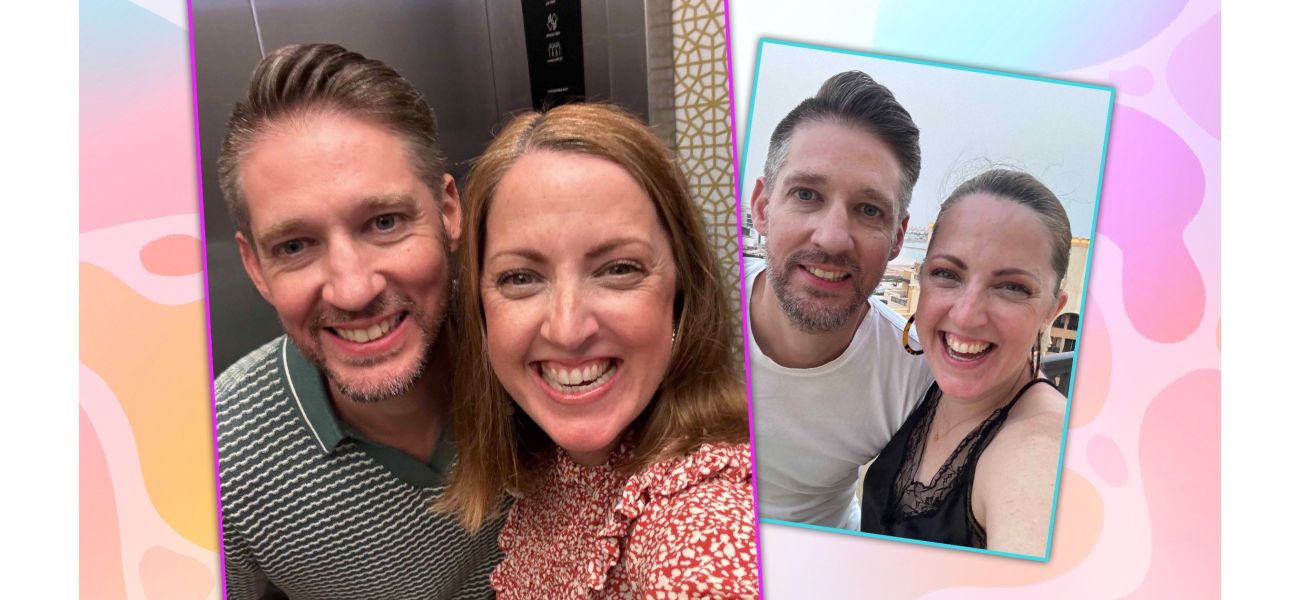Together, my partner and I, both with ADHD and autism, are a strong and complementary team.
Our relationship has reached a deeper understanding as we now understand each other better.
October 19th 2024.

Hester and her husband Kelly are a unique couple, both being neurodivergent. Five years ago, their two children were diagnosed with autism, which was a learning experience for the whole family. As they observed their children's behaviors and traits, it became clear to Kelly that he also shared many of these characteristics. In his early 40s, he was officially diagnosed with autism, which finally made sense of his life.
During the lockdown, their children were also diagnosed with ADHD, and during the assessment, the psychologist asked Hester about her own neurodiversity. This came as a shock to her as she had never considered the possibility of being neurodivergent. At the age of 46, she was officially diagnosed with ADHD, and soon after, Kelly was also diagnosed, making them a truly neurodivergent family.
It's not just their family dynamic that has been shaped by their diagnoses, but also their relationship. Hester and Kelly have been together for 22 years and always got along well, but now they understand each other on a deeper level. They even work together on their business, Perfectly Autistic, which they believe was meant to be. Their different neurodivergent traits complement each other and have brought their relationship to a new level.
Their diagnoses have also helped them to understand their struggles and be kinder to each other and themselves. Moving to a new house was a stressful experience, but knowing why they feel overwhelmed has made it easier to manage. Hester, who is also an ADHD coach, believes that communication is key in their relationship. They have learned to explain things in different ways and to be patient when they don't understand each other.
Hester and Kelly are not alone in their experience as a neurodivergent couple. Jo McMeechan and Alex Jay Lynam, who both live with an array of neurodivergent conditions, can relate to their journey. Alex has ADHD, dyslexia, dyscalculia, dyspraxia, and Irlen Syndrome, while Jo was diagnosed with ADHD after her youngest child was also diagnosed with ADHD and autism.
For many parents, their children's diagnoses can be a lightbulb moment for themselves, as was the case for Jo. She had always struggled with certain things, but it wasn't until her child's diagnosis that she realized she also had ADHD. Alex, on the other hand, is currently self-diagnosed with ADHD due to the lengthy and intense diagnostic process. However, with the long waiting times for assessments, many in the neurodivergent community recognize the validity of self-diagnosis.
Neurodiversity is a broad term that encompasses various conditions, including ADHD and autism. Hester and Kelly's family, along with Jo and Alex's, are just a few examples of how neurodivergent individuals can thrive in different ways. Though it can be challenging, being in a relationship with a neurodivergent person also has its rewards. They are honest, loyal, and caring partners who wear their hearts on their sleeves. As Hester puts it, "us neurodivergent folk flock together."
Hester and her husband Kelly are not your typical couple. They are both neurodivergent, which means they have brains that function differently from the average person. This discovery came about five years ago when their two children were diagnosed with autism. As a family, they embarked on a learning curve together, and it was during this time that Kelly also discovered that he was autistic. At the age of 40, everything suddenly made sense to him.
But the surprises didn't stop there. During lockdown, both of their children were also diagnosed with ADHD, and during the assessment, the psychologist asked Hester about her own neurodiversity. This came as a shock to her, as she had never considered the possibility before. At the age of 43, she was officially diagnosed with ADHD, and Kelly went on to be diagnosed as well. They were now a truly neurodivergent family.
Their experience with their children's diagnoses and their own has not only shaped their family dynamic, but it has also brought Hester and Kelly closer together. In fact, they now believe that they were always meant to be together. After 22 years of marriage, they have always gotten along well, but now they understand each other on a deeper level. This has even translated into their work life, as they now run a business together called Perfectly Autistic.
Their diagnoses have helped them to be kinder to each other and themselves, as they now understand the struggles and challenges they face. Moving to a new house, for example, can be overwhelming, but knowing the root of their struggles has made it easier to cope. However, this doesn't mean that they don't have to work on their communication styles. Being neurodivergent can be frustrating, especially when trying to communicate with someone who doesn't understand your way of thinking. But they have found ways to work through it and communicate effectively.
Hester and Kelly are not the only neurodivergent couple out there. Jo and Alex, who live in Bristol, also fall under the neurodivergent spectrum. Alex lives with ADHD, dyslexia, dyscalculia, dyspraxia, and Irlen Syndrome, and Jo has ADHD, which she discovered after her youngest child was diagnosed with ADHD and autism. For many parents, their child's diagnosis can be a lightbulb moment, and that was exactly the case for Jo.
So what exactly is neurodiversity, and how do ADHD and autism fit into it? Neurodiversity is an umbrella term that encompasses a range of conditions that affect brain function, such as ADHD and autism. People who are neurodivergent may think, learn, and process information differently from the average person, but that doesn't mean they are any less capable or intelligent. In fact, their unique perspectives can bring valuable insights and strengths to society.
While being neurodivergent can come with its own set of challenges, it also brings loyalty, honesty, and a different way of viewing the world. And as Hester says, "Us neurodivergent folk flock together." Hester and Kelly's experience has shown that being neurodivergent doesn't have to be a barrier in relationships. In fact, it has brought them closer and helped them to understand and support each other in ways they never thought possible.
During the lockdown, their children were also diagnosed with ADHD, and during the assessment, the psychologist asked Hester about her own neurodiversity. This came as a shock to her as she had never considered the possibility of being neurodivergent. At the age of 46, she was officially diagnosed with ADHD, and soon after, Kelly was also diagnosed, making them a truly neurodivergent family.
It's not just their family dynamic that has been shaped by their diagnoses, but also their relationship. Hester and Kelly have been together for 22 years and always got along well, but now they understand each other on a deeper level. They even work together on their business, Perfectly Autistic, which they believe was meant to be. Their different neurodivergent traits complement each other and have brought their relationship to a new level.
Their diagnoses have also helped them to understand their struggles and be kinder to each other and themselves. Moving to a new house was a stressful experience, but knowing why they feel overwhelmed has made it easier to manage. Hester, who is also an ADHD coach, believes that communication is key in their relationship. They have learned to explain things in different ways and to be patient when they don't understand each other.
Hester and Kelly are not alone in their experience as a neurodivergent couple. Jo McMeechan and Alex Jay Lynam, who both live with an array of neurodivergent conditions, can relate to their journey. Alex has ADHD, dyslexia, dyscalculia, dyspraxia, and Irlen Syndrome, while Jo was diagnosed with ADHD after her youngest child was also diagnosed with ADHD and autism.
For many parents, their children's diagnoses can be a lightbulb moment for themselves, as was the case for Jo. She had always struggled with certain things, but it wasn't until her child's diagnosis that she realized she also had ADHD. Alex, on the other hand, is currently self-diagnosed with ADHD due to the lengthy and intense diagnostic process. However, with the long waiting times for assessments, many in the neurodivergent community recognize the validity of self-diagnosis.
Neurodiversity is a broad term that encompasses various conditions, including ADHD and autism. Hester and Kelly's family, along with Jo and Alex's, are just a few examples of how neurodivergent individuals can thrive in different ways. Though it can be challenging, being in a relationship with a neurodivergent person also has its rewards. They are honest, loyal, and caring partners who wear their hearts on their sleeves. As Hester puts it, "us neurodivergent folk flock together."
Hester and her husband Kelly are not your typical couple. They are both neurodivergent, which means they have brains that function differently from the average person. This discovery came about five years ago when their two children were diagnosed with autism. As a family, they embarked on a learning curve together, and it was during this time that Kelly also discovered that he was autistic. At the age of 40, everything suddenly made sense to him.
But the surprises didn't stop there. During lockdown, both of their children were also diagnosed with ADHD, and during the assessment, the psychologist asked Hester about her own neurodiversity. This came as a shock to her, as she had never considered the possibility before. At the age of 43, she was officially diagnosed with ADHD, and Kelly went on to be diagnosed as well. They were now a truly neurodivergent family.
Their experience with their children's diagnoses and their own has not only shaped their family dynamic, but it has also brought Hester and Kelly closer together. In fact, they now believe that they were always meant to be together. After 22 years of marriage, they have always gotten along well, but now they understand each other on a deeper level. This has even translated into their work life, as they now run a business together called Perfectly Autistic.
Their diagnoses have helped them to be kinder to each other and themselves, as they now understand the struggles and challenges they face. Moving to a new house, for example, can be overwhelming, but knowing the root of their struggles has made it easier to cope. However, this doesn't mean that they don't have to work on their communication styles. Being neurodivergent can be frustrating, especially when trying to communicate with someone who doesn't understand your way of thinking. But they have found ways to work through it and communicate effectively.
Hester and Kelly are not the only neurodivergent couple out there. Jo and Alex, who live in Bristol, also fall under the neurodivergent spectrum. Alex lives with ADHD, dyslexia, dyscalculia, dyspraxia, and Irlen Syndrome, and Jo has ADHD, which she discovered after her youngest child was diagnosed with ADHD and autism. For many parents, their child's diagnosis can be a lightbulb moment, and that was exactly the case for Jo.
So what exactly is neurodiversity, and how do ADHD and autism fit into it? Neurodiversity is an umbrella term that encompasses a range of conditions that affect brain function, such as ADHD and autism. People who are neurodivergent may think, learn, and process information differently from the average person, but that doesn't mean they are any less capable or intelligent. In fact, their unique perspectives can bring valuable insights and strengths to society.
While being neurodivergent can come with its own set of challenges, it also brings loyalty, honesty, and a different way of viewing the world. And as Hester says, "Us neurodivergent folk flock together." Hester and Kelly's experience has shown that being neurodivergent doesn't have to be a barrier in relationships. In fact, it has brought them closer and helped them to understand and support each other in ways they never thought possible.
[This article has been trending online recently and has been generated with AI. Your feed is customized.]
[Generative AI is experimental.]
0
0
Submit Comment





